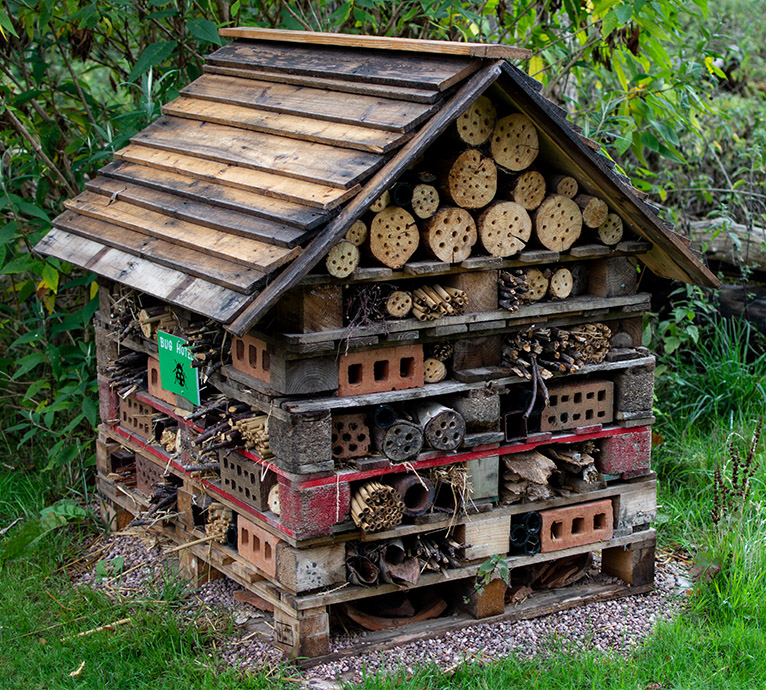Our nation’s garden centres may be full of bug sprays and a beginner’s kit for chemical warfare against insects, but the best gardeners know that creating a good balance of bug life is good for both garden and environment. This balance of bugs in the garden will help to pollenate your plants and fruit trees, as well as ensuring that those which can damage your flowers or vegetables don’t stick around for long.
The decline in bee populations has highlighted how important our insects are. So many experts are now endorsing the use of plants that attract the kind of wildlife you have to get down on your knees to see, as well as the use of bug houses to offer a space for bugs to breed, shelter and to settle down for winter.

Tips for creating an insect friendly garden
The bug house is the most basic item for creating an insect friendly garden. These can be purchased from garden centres fairly cheaply or bought online in various sizes. These are simply wooden tubes set into houses or in bundles. You can even make your own from some bamboo canes.
These bug houses or hotels will make a good home for many kinds of insects, from lone bees to ladybirds, allowing them to hibernate at the end of the season. A compost heap will also make a good hibernation spot for bugs, as well as attracting insects of the right kind to your garden, ensuring healthy soil and a good eco system. Compost heaps also attract frogs and toads, although they can also attract vermin. So be sure to keep an eye on it and do disturb any vermin before they become settled.
Plants are the very best thing for creating an insect friendly garden and there are various guides as to which plants you should buy if you want to do this. The Royal Horticultural Society has a great list of pollenating plants that should attract the right sort and you can even plan your garden around a scheme like this. Bright flowers with easy-to-reach pollen are always good and you will forever find plenty of insects around plants such as lavender. Buddleia will attract butterflies and ladybirds will be attracted by anything that promises them a plentiful supply of aphids to dine on, with bean varieties being particularly good for this.
Once you get into the swing of making an insect friendly garden you can go further and try companion planting, which means growing plants alongside each other where the insects that feed on pests will be attracted by proximity and the plants may also help each other to grow. So, you may want to grow dill to attract aphid eaters such as wasps and hoverflies next to where you grow a crop likely to be attacked by aphids. Marigolds with tomatoes is another classic companion planting combination. These pairings have been used by organic gardeners for years to cut back on the need for pesticides or fertilisers.
You will find that your insect friendly garden should attract lots of bees. But should you attract a swarm of bees then don’t reach for the fly spry or worry that you will have to spend all summer stuck indoors. Simply contact a local beekeeper and they will be more than happy to take the swarm off your hands. Community groups or council environmental teams should have contact details and a quick internet search should turn up beekeeping enthusiasts in your area.
No system will entirely keep the pests out and you are sure to still attract your fair share of slugs and snails. But growing a garden that attracts insects will give you new-found admiration for their industry and allow you to enjoy yours in the knowledge that you are doing good for the environment, as well as making sure that yours and your neighbours’ plants and trees are pollenated.
If you need help designing and planting your insect friendly garden, post your job in our Gardener/Garden Designer category. Up to three tradesmen can contact you to quote and you’ll be able to view their profile pages, complete with customer ratings, to help you decide who to hire.




I am all in favour of having some wild life in our garden as I think it’s so important to attract the bees to pollinate our flowers and if we had a bigger garden we would loved to have a bee hive.
Excellent article – thank you for addressing your previous comments about bees!
Love bees. Love this blog.